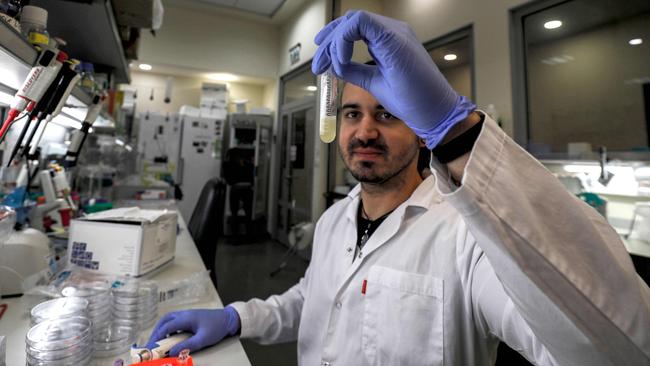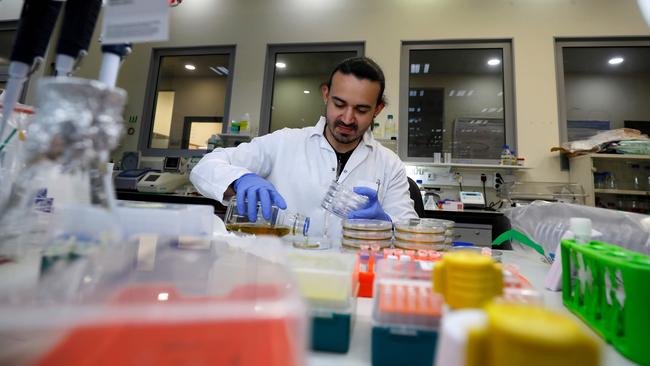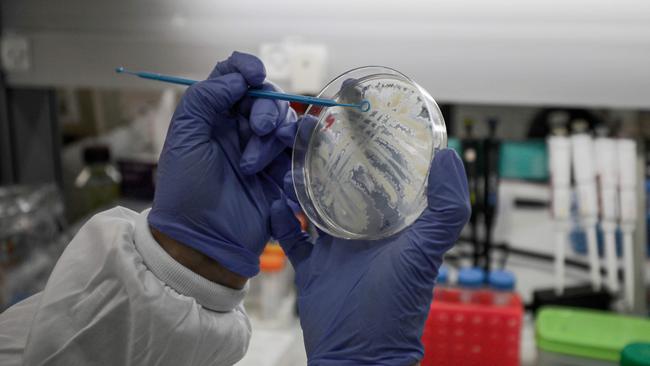Coronavirus: Israeli scientists ‘close’ to developing vaccine
Israeli scientists could have a vaccine in 90 days, as years of research into avian coronavirus are adapted to the new strain.

Israeli scientists claim to be close to developing a vaccine for coronavirus that could be available in about 90 days.
The MIGAL Galilee Research Institute says its researchers have developed an effective vaccine against avian coronavirus Infectious Bronchitis Virus (IBV), which is to be adapted soon and create a human vaccine against COVID-19.
“After four years of multidisciplinary research funded by Israel’s Ministry of Science and Technology in co-operation with Israel’s Ministry of Agriculture, MIGAL has achieved a scientific breakthrough that will lead to the rapid creation of a vaccine against coronavirus,” the institute says on its website.
“This possibility was identified as a by-product of MIGAL’s development of a vaccine against IBV (Infectious Bronchitis Virus), a disease affecting poultry, whose effectiveness has been proven in preclinical trials carried out at the Volcani Institute. MIGAL has now made required genetic adjustments to adapt the vaccine to COVID-19, the human strain of coronavirus, and is working to achieve the safety approvals that will enable in-vivo testing, enable the initiation of production of a vaccine to counter the Coronavirus epidemic currently spreading throughout the world.”
Institute chief executive David Zigdon says the organisation is doing everything it can to accelerate development.
Australian scientists say Israel is one of several countries putting its resources into developing a vaccine for the virus, also called COVID-19. However a leading infectious diseases expert warns that it will take months to conduct animal trials and human trials and gain approval if and when the vaccine comes to fruition.
The MIGAL news statement refers to funding by Israel’s Ministry of Science and Technology in co-operation with Israel’s Ministry of Agriculture and was published just days before a predicted knife-edge national election in Israel.

Professor Kristine Macartney, a paediatrician specialising in infectious diseases and vaccinology at The University of Sydney, says the development is “very interesting” but makes “overly optimistic time frames” for trials and distribution.
Profess or Macartney says we will see many different approaches to vaccine development and different information around “vaccine candidates”.
“This is excellent. It is really acknowledging that many groups across the globe are working with incredible effort to develop candidate vaccines.
“Nonetheless, there are some absolutely essential steps that are required for any candidate vaccine before it can be used even in human studies, let alone be taken through to larger groups of people to study, and then before it would even be available in some sort of regulated way to those either at highest risk or the population more broadly.”
She says many groups have been working on a whole range of new technological platforms for the delivery of vaccines, including at The University of Queensland research institute.
She says the Israeli researchers are employing a technology they have been testing in a veterinary context for preventing a poultry coronavirus “so it is a bit of a reach to be honest”.

Professor Macartney also commented on local public measures, such as the need for Australians to get a flu jab this year which she supports. “It (the jab) won’t have any effect against coronavirus, but it is absolutely to ensure that people don't experience a double whammy from another serious respiratory illness which is influenza.”
She says having the regular flu might impact your ability to flight coronavirus. “We know that influenza can have an impact on your lungs, obviously, and on your overall health.
“We don't know what that would mean for people who might get the two infections either simultaneously or one after the other.
“We definitely know that we want to have the population as well as they can possibly be.”
She says claims that COVIT-19 is no more a risk than regular flu is wrong. “There is some partial and variable immunity to the different influenza strains in the whole of the population right now, but what we are talking about at the moment is a completely novel virus, which as far as we understand, we do not think people are immune to the virus as we know it.”
She says people might want to check with their doctor ahead of time how they will conduct testing for the virus if people start to feel unwell as we head into winter.
They may have the regular flu, but nevertheless patients may want testing, but be reluctant to sit in a doctor’s waiting room fearing cross contamination.
She says that in NSW, NSW Health has a list of where testing facilities are on its coronavirus website. “All those testing facilities will simultaneously test for up to 15 other respiratory viruses at the same time if the doctor requests it.”
University of Melbourne Associate Professor Margie Danchin urged caution, warning suggestions of a vaccine so soon seemed overly optimistic.
“I would agree with Prof Kristine Macartney’s and her comments,” she said.
“Whilst the global community would welcome a vaccine against against COVID-19, the timeframes for this groups claims seem unreasonably short and a reach.”
Associate Professor Danchin said a focus on developing a vaccine against COVID-19 missed the effectiveness of a flu vaccine in protecting people.
“It is far better for people to be focusing on protection from flu with the seasonal vaccine early and understanding now they can limit their risk in coming into contact or spreading the virus,” she said.







To join the conversation, please log in. Don't have an account? Register
Join the conversation, you are commenting as Logout